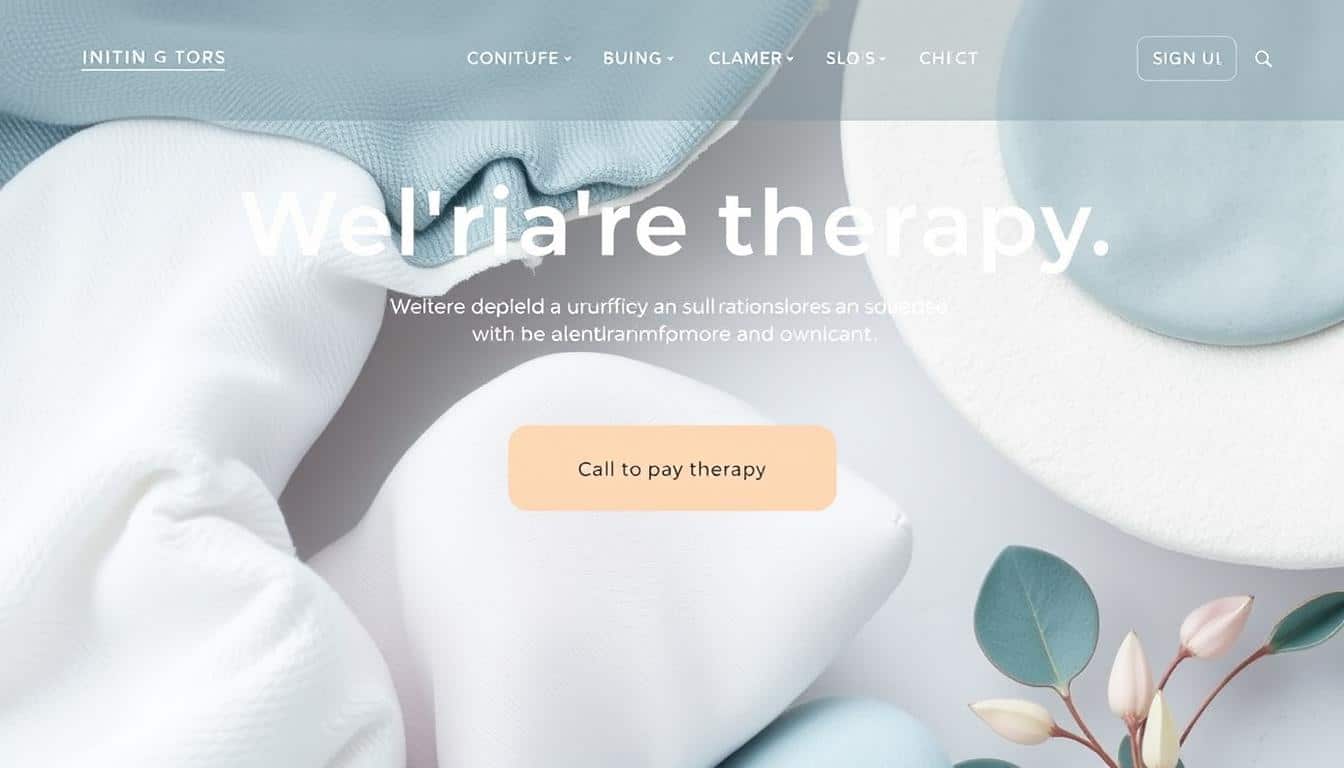Creating a great therapy website is key today. It’s a way for people to find your help and learn about your services. In this guide, we’ll share many ideas to engage, inspire, and empower your audience.
Whether you’re experienced or new, this article will help you make a website that speaks to your clients. We’ll talk about showing off your unique approach and helping with mental health. You’ll learn how to build trust, connect emotionally, and share knowledge through various content.
Key Takeaways
- Discover ideas to showcase your expertise and build a strong online presence for your therapy practice
- Learn how to craft a compelling introduction and welcome your clients to a world of healing
- Explore ways to unveil your therapeutic approach and highlight your qualifications
- Discover strategies to cultivate trust and transparency through client testimonials and resources
- Unlock the power of educational content to nurture mental wellness and empower your clients
Welcome to a World of Healing
At the heart of our therapy website, we aim to create a welcoming space. Here, people can start their journey towards emotional well-being. We offer mental health resources, counseling services, and therapeutic approaches that fit your needs. Our goal is to help you find balance and fulfillment in life.
Crafting a Compelling Introduction
Your first impression matters a lot. Our team has worked hard to make a great first impression. We encourage you to check out our online therapy services. See how our caring approach can help you face life’s challenges with strength and self-acceptance.
Showcasing Your Expertise
As you explore our website, you’ll learn about our therapists’ skills and the therapeutic approaches we use. We offer everything from Cognitive Behavioral Therapy to Mindfulness-Based Therapy. Our team is committed to giving you personalized care that leads to positive change and self-discovery.
“Healing doesn’t mean the damage never happened. It means the damage no longer controls our life.” – Unknown
Our practice is built on compassionate care, confidentiality, and a focus on growth and resilience. We believe in the power of mental health resources and counseling services to transform lives. We invite you to start your journey towards a more fulfilling and balanced life.
Unveiling Your Therapeutic Approach
Choosing the right psychotherapy techniques and approaches is key for your mental health journey. Our practice offers a tailored, evidence-based approach. We address each person’s unique needs and challenges.
Our psychotherapists are trained in many modalities. This includes:
- Cognitive-Behavioral Therapy (CBT): This practical, goal-oriented approach helps clients identify and change negative thought patterns. It improves emotional and behavioral responses.
- Mindfulness-Based Interventions: By cultivating present-moment awareness, clients learn to manage stress, regulate emotions, and enhance overall well-being.
- Family Systems Therapy: This approach focuses on the dynamic interactions within families. It helps clients strengthen relationships and foster healthier communication patterns.
Your therapist will work with you to create a personalized treatment plan. They will use the most effective techniques and approaches. Together, we’ll journey through self-discovery, personal growth, and lasting transformation.
| Psychotherapy Technique | Key Benefits |
|---|---|
| Cognitive-Behavioral Therapy (CBT) | Improves emotional regulation, reduces negative thought patterns, and fosters healthier behaviors. |
| Mindfulness-Based Interventions | Enhances self-awareness, stress management, and overall well-being. |
| Family Systems Therapy | Strengthens family relationships and communication, promoting a healthier family dynamic. |
“Discovering the right therapeutic approach is like finding the key that unlocks the door to your personal growth and transformation.”
At our practice, we’re committed to guiding you through this transformative process. We empower you to overcome challenges, cultivate inner resilience, and achieve the life you envision. Take the first step towards a more fulfilled, balanced, and authentic you.
Therapy Website Content Ideas: The Cornerstone
Creating a strong online presence is key to attracting clients and showing your expertise in mental health. Your website’s main content, like service descriptions and about pages, should be clear and easy to find online. Using the right keywords helps clients find you and know what services you offer.
Incorporating Relevant Keywords
To make your therapy website more visible, use relevant keywords in your content. These keywords should match your services, areas of expertise, and what people search for when looking for mental health help.
- Find out what terms your target audience uses to search for therapists or mental health professionals.
- Put these keywords into your website’s content, like service descriptions and about pages.
- Make sure the keywords fit naturally into your content, without making it hard to read.
- Keep checking and updating your keywords to stay relevant and keep up with search trends.
By using the right keywords, you can boost your website’s SEO. This makes it more likely for people to find your therapy practice when they need mental health resources.
| Keyword | Search Volume | Keyword Difficulty |
|---|---|---|
| therapy website content ideas | 1,600 | 47 |
| mental health resources | 5,400 | 54 |
| online therapy services | 2,900 | 51 |
| counseling practice website | 720 | 40 |
By using these keywords and optimizing your website’s core content, you can improve your online presence. This makes it easier for potential clients to find and connect with your therapy practice.
Cultivating Trust and Transparency
Building a strong relationship with your clients is key to your success. To do this, show your qualifications and use real client testimonials.
Highlighting Your Qualifications
People looking for mental wellness and emotional support want to trust you. Share your education, licenses, and certifications. This shows you know what you’re doing in counseling services.
By showing your qualifications, you make clients feel sure about your care.
Embracing Client Testimonials
Real stories from your clients are powerful. Use genuine testimonials that show how your counseling services helped them. These stories build trust and show what clients can expect from you.
“The counseling sessions with [your name] have truly transformed my life. I feel empowered, heard, and supported in my journey towards emotional healing.”
By being open about your qualifications and using client testimonials, you create a safe space. This encourages people to start their mental wellness journey with your counseling services.

| Qualification | Details |
|---|---|
| Master’s Degree in Counseling | Awarded from [University Name], specializing in [Specialization] |
| Licensed Professional Counselor (LPC) | State-issued license, [License Number] |
| Certified Clinical Trauma Professional (CCTP) | Certification from the International Association of Trauma Professionals |
Nurturing Mental Wellness
Supporting your emotional well-being is key. Access to self-help tools can change the game. These resources help you find effective coping strategies and understand your mental health better. This is true even when you’re not in therapy.
Offering Self-Help Resources
We believe in empowering you to take charge of your mental wellness. That’s why we’ve put together educational articles, interactive worksheets, and guides. They help you tackle common challenges and find solutions that work for you.
- Discover mindfulness techniques to calm the mind and reduce stress
- Explore journaling prompts to unveil your inner thoughts and emotions
- Learn about the power of positive affirmations and how to incorporate them into your daily life
- Dive into self-care practices that nourish your overall well-being
Using these self-help resources will help you understand your mental health better. You’ll also build confidence and resilience to face challenges head-on. Your well-being is our priority, and we’re here to support you.
“The greatest weapon against stress is our ability to choose one thought over another.” – William James
Fostering Emotional Connection
Therapy is more than just knowing how to help. It’s about building a real, emotional connection with your clients. Your website can help create this connection, even before you meet.
Start by sharing your personal story. Talk about what led you to become a therapist. Let clients see the person behind the professional. Explain how your therapeutic approaches are influenced by your life.
“Therapy is not just about fixing problems; it’s about building a relationship built on trust, empathy, and mutual understanding.”
By adding real, emotional content to your website, clients will feel understood and supported. They’ll see that you treat them as an individual, not just a case.

Your website should show the emotional support and healing you offer. When clients connect with your story and approach, they’re more likely to seek change.
Empowering Through Education
As a trusted mental health professional, you can empower your clients through education. By exploring various mental health topics and sharing coping strategies, you equip them with tools for life’s challenges. This helps them achieve greater well-being.
Exploring Mental Health Topics
Look into topics like anxiety, depression, trauma, and relationships. Share research-based insights and advice. This helps your clients understand their struggles better and find ways to manage them.
Sharing Coping Strategies
- Introduce mindfulness techniques, such as meditation and deep breathing exercises, to help clients cultivate inner calm and resilience.
- Suggest journaling as a means of self-reflection and emotional expression, empowering clients to process their thoughts and feelings.
- Share strategies for building healthy routines, including regular exercise, balanced nutrition, and restorative sleep habits, which can contribute to overall mental health.
By offering these mental health resources and coping strategies, you empower your clients. They can take an active role in their self-help and personal growth. This fosters a deeper sense of control and empowerment.
“The greatest weapon against stress is our ability to choose one thought over another.” – William James
| Coping Strategies | Benefits |
|---|---|
| Mindfulness Practices | Reduced stress and anxiety, improved focus and emotional regulation |
| Journaling | Enhanced self-awareness, emotional processing, and problem-solving |
| Healthy Routines | Improved physical and mental well-being, increased energy and productivity |
By empowering your clients through education and practical coping strategies, you help them take an active role in their mental health journey. This fosters a sense of control and resilience that will serve them well in the long run.
Embracing Multimedia Engagement
Make your therapy website more engaging with multimedia like videos or podcasts. These formats help clients understand your services better. They also learn self-care techniques and connect emotionally with your practice.
Using multimedia makes your content more accessible. It meets different learning styles and preferences.
Incorporating Videos and Podcasts
Use video to showcase your expertise. You can share guided meditations or discuss mental health strategies. Videos capture your audience’s attention and build trust in your abilities.
Pair your videos with thought-provoking podcasts. In these, you can explore topics in-depth. You’ll offer valuable self-help tools and emotional support. This approach makes your online therapy more engaging and immersive for your clients.



